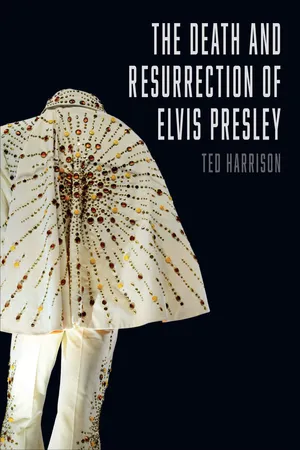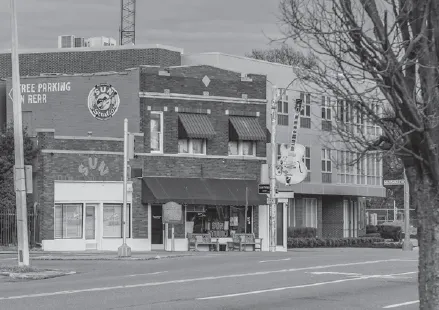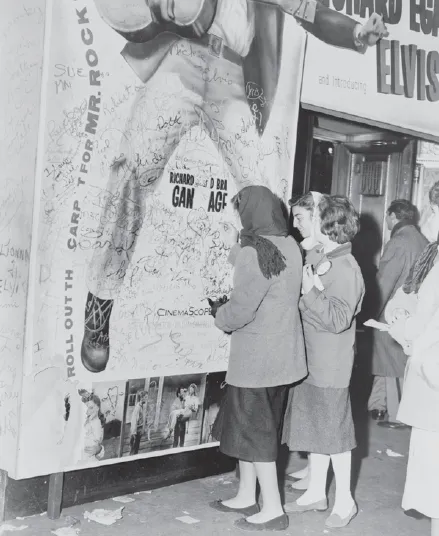![]()
1
‘The End is Where We Start From’
Every true Elvis fan knows the story of how the young unknown singer auditioned at the Sun Studio in Memphis in the summer of 1954. It has gone down in history as the moment rock ’n’ roll was born – late in the evening of 5 July. In those days, when a disc was being cut, musicianship and raw talent were more important than technological wizardry. The studio boss, Sam Phillips, had the latest tape-recording equipment, but compared to today it was rudimentary. What mattered was that present in the studio were two professional musicians and one genuine raw talent.
Not that Elvis Presley had that evening made much of an impression, or at least to begin with. He was nervous and the few numbers he had sung were restrained and stilted. Then, so the story goes, during a break in recording he relaxed and started singing a song by the African American blues songwriter Arthur ‘Big Boy’ Crudup. Scotty Moore, one of the two musicians accompanying Elvis, described what happened.
All of a sudden, Elvis just started clowning. I joined in as soon as I found out what key we were in. Then, the control room door opened. Sam came out and said, ‘what you all doing?’ Elvis said, ‘just goofing.’ Sam said, ‘well that sounds pretty good. Back up and let’s put it on tape.’1
Where it all began – Elvis made his first recording at the Sun Studio in Memphis. Today it is on the itinerary of every serious Elvis fan making a pilgrimage to the city.
What Sam Phillips recognized was that in the Elvis version of ‘That’s All Right, Mama’, and its spontaneous and instinctive fusion of black and white culture, he had heard something special. He enhanced the sound with a subtle aura of quavering echo, one of the few add-ons at his disposal in those basic days of studio recording. It was the first time he had used the effect in recording a white singer. ‘It was a stroke of genius,’ Albert Goldman was to note in his epic and controversial biography of Elvis,
perhaps the most brilliant inspiration of this famous producer’s career . . . He added to this new star’s raw and untrained voice the electronic prosthesis that masked his vocal faults while it transformed – or should we say transfigured? – his vocal quality into the now legendary Presley sound.2
The moment Sam Phillips captured the sound on tape he knew he had found the elusive sound he had long hoped to find. ‘A white man with the negro sound and the negro feel’, he used to say, would make him a billion dollars. It was radical, almost dangerous thinking for its time and place. In the Southern states of the USA in the mid-1950s, segregation and racial prejudice were a way of life. African Americans, or ‘Negroes’ in the dated and unreformed language of the era, seldom mixed with white Americans of European descent and certainly not on equal terms. It was not until the year after Elvis’s recording debut that Rosa Parks famously refused to move from a ‘whites-only’ seat on a segregated bus in Montgomery, Alabama. And it was nine years before Martin Luther King Jr delivered his celebrated ‘I have a dream’ speech. Over the course of his career, however, Sam Phillips worked with musicians across the racial divide. He recorded Roy Orbison and Johnny Cash as well as B. B. King and Ike Turner. He was right; there was a billion dollars to be made, and much more, if only he could meld together the music of the two traditions, although few of those dollars were to come his way.
The story of Elvis over the following 23 years is one of a meteoric rise, a downward slide, a second wind and a sad end. Dozens of versions of this story have been told. Some have been more popular with fans than others. A fan might favour the Elvis story packed out with statistics, dates and details. Another might prefer his life story told in mystical, religious tones. ‘He was born in a house little bigger than a stable,’ begins one of the Elvis sagas from a popular oral tradition, finishing with the words ‘and he died in ignominy betrayed by his friends’.
When Elvis burst on to the music scene he was both a breath of fresh air and a culture shock. Initially he was viewed as a threat by staid Middle America; respectable, God-fearing, straight-laced, traditional, white society which held the power and controlled the wealth of the country. His physical movements when performing, from the grinding, gyrating hips, to his caressing of the microphone, were thought so sexually explicit that he was denounced as a malign influence on young Americans’ morals. His promotion of African American music alarmed white Middle America even more. Elvis’s appeal was apolitical, but as potent as, or perhaps more potent than, any overt political challenge to the status quo, especially in that he appealed to a new, younger generation of Americans. He was challenging the assumptions that underpinned the racial segregation of the time. Not only did Elvis appreciate and adopt music rooted in African and slave culture, but he went further. He used his body as an instrument and the instinctive movements, gestures and thrusts that became identified with the early Elvis were his unique interpretation of what he had seen as well as heard on Beale Street and elsewhere, where he had watched the black musicians of his youth. ‘The body itself’, one American musicologist noted, ‘was the primary instrument through which African rhythm was publicly choreographed.’3 Thus Elvis’s movements were a public exhibition, not only of sexuality, but ‘black sexuality’. And furthermore, and especially disturbing to Middle America, these allegedly depraved movements were seductive. ‘This sexual seduction of whites into blackness was unstoppable.’4
With hindsight fans have come to realize that when American establishment figures, with the backing of the American mainstream media, accused Elvis of being vulgar and deliberately sexual,
This was the cover for what was really meant, what was really feared, and that was that Elvis would lead to equal rights and racial integration. Following his appearance on the Milton Berle television show [on 5 June 1956], when his sensual performance of ‘Hound Dog’ sent the audience wild, Elvis was savaged by critics who described his leg-shaking, hip-swiveling performance as ‘noxious’ and his singing as ‘caterwauling’. Often the criticism had a racist edge, since Elvis was singing what was considered ‘black music’. One critic summed up his performance as ‘the kind of animalism that should be confined to dives and bordellos’.5
Frank Sinatra, the top crooner of the day, whose music was soon to be overshadowed by rock ’n’ roll, described the new sound as
the most brutal, ugly, degenerate, vicious form of expression it has been my displeasure to hear. It fosters almost totally negative and destructive reactions in young people. It smells phoney and false. It is sung, played and written for the most part by cretinous goons and by means of its almost imbecilic reiterations and sly, lewd, in plain fact, dirty, lyrics, it manages to be the martial music of every sideburned delinquent on the face of the earth . . . This rancid-smelling aphrodisiac I deplore.6
Although not directed at Elvis by name, it is thought by many fans to be a direct shot aimed at the up-and-coming King.
‘Elvis Aron Presley didn’t start life as a particularly unique or notable individual, except for his outstanding singing voice,’ says Louie Ludwig, author of The Gospel of Elvis: The Testament and Apocrypha of the Greater Themes of ‘The King’. He was however in the right place at the right time, just as teenage culture came into being, when a post-war generation of young people, with money in their pockets, began to make their own choices as consumers. Young Americans were beginning, as Ludwig notes, to
chafe at the cultural yoke of their society, funding a revolution by jamming nickels into juke boxes and sneaking under bed sheets to tune into Alan Freed and the few others who dared play ‘race’ music on high-powered radio stations. But media moguls of all stripes were beginning to face the reality that listeners weren’t going for the standard wartime formula of a crooner backed by dance orchestra. Those nutty kids seemed to prefer gulping hillbillies like Buddy Holly and mad shamans like Little Richard. What was missing was a personality who could bring this wild, new energy into the mainstream.7
Their parents were baffled that their offspring preferred the raucous sounds of rock ’n’ roll to the smooth, polished, tuneful sounds they had danced to and which they recognized as popular music. The new music was also the product of emerging technology. The electric guitar had been invented in the 1930s, but in the 1950s it started to be mass-produced and became affordable. It emerged as the instrument of choice for the new rock ’n’ rollers and was used to create the distinctive new style.
Elvis arrived not only in the right place at the right time, but in possession of exactly the right talent and image. It was a chance arrival, rather than anything planned. And he also had the right background in music, having absorbed African American culture from an early age. There was nothing manufactured about Elvis. Unlike the boy bands of later years, brought together by manipulative managers to surf a tide of musical fashion, Elvis was the genuine article. His family background had given him access to the music of the impoverished South, both black and white, and his indulgent mother gave him space and encouragement to daydream.
Elvis was raised as an only child and developed a close relationship with his mother, Gladys, a relationship that has attracted the subsequent interest of psychologists who have seen Oedipal undertones in it. It is not surprising from his background that Elvis became a strange and rather lonely teenager. His musical interests and tastes extended beyond those of his peers and community. His dress sense was quirky and individualistic. He stood out from the local crowd as a bit of an oddball, although in his final years at Humes High School he gathered supporters and protectors, including Red West and George Klein, who were to remain in his inner circle for many years. The style he had developed was not the result of a marketing or business plan, it was just Elvis pleasing himself and expressing his individuality. As an obscure teenager he had his dreams. Many of them were drawn from the comic books he read. He may well have imagined himself as a superhero in the making, but no one who knew him at the time had any way of foretelling that the look and sound he nurtured would become so celebrated and iconic. It was very much later that curious apocryphal stories emerged of the child Elvis being shown his destiny by angels.
When Elvis started making waves within the musical world, the record industry moguls quickly realized that there was no point in complaining about his style and music; if money was to be made from this new musical fashion, they had to come to terms with it. Sam Phillips had sold his interest in Elvis’s recording career to RCA in 1955, a deal he much regretted later, but at the time he needed the cash. RCA, a major recording company, had a direct stake in ensuring Elvis was a money-spinner. ‘Perhaps all of us, including the man we have declared King, would be better off today if the good Sam hadn’t sold Elvis’ contract to RCA,’ notes Louie Ludwig. ‘If Elvis had been given time and freedom to get comfortable being a rhythm and blues success, part of an exciting, regional sound, he might be alive today. Instead, he was tossed to the publicity mill, nutted and homogenized, turned from prodigy to product, and eventually to parody, sold before his time.’8
The conservative interests in American society, who had been horrified by the emergence of this lewd and challenging entertainer, quickly accepted that Elvis was not a flash in the pan. They began to explore how the forces he had unleashed could be tamed. At the height of Elvis’s early career, the U.S. military public relations department grabbed an opportunity. It realized what a publicity coup could be had if it were to get involved in the process of repackaging and manipulating Elvis. It was a time of military conscription and, when Elvis dutifully joined the army in 1958 and his thick, black, slicked-back hair was cut, his reputation started to change. That was the day he really died, said John Lennon, expressing the disappointment of many of the younger generation.
Elvis could probably have avoided the draft; many wealthy Americans found ways of avoiding military service. It was even suspected that his manager, Colonel Tom Parker, saw the public relations advantages of having his boy join up and volunteered him. Most likely the initiative came from the army and Parker did not want to make a fuss by having Elvis oppose the draft, for reasons that were to emerge later. Fans protested vehemently when the call-up was announced. Paramount Studios, who had started work on the film King Creole with Elvis as the irreplaceable star, asked for the draft to be delayed. The draft board agreed a sixty-day deferment, allowing the film to be completed, much to the relief of studio accountants.
Teenage girls sign their names and send messages to Elvis on an Elvis movie poster, 1956.
Joining the army was the career move that took Elvis from cultural rebel to America’s favourite son. When his manager later locked him into contracts requiring him to make a succession of popular but unchallenging formulaic, eye-candy films, Elvis was forever established as the all-American icon. The fact that he was making money also helped to make him respectable in his home country. Life magazine had initially described Elvis as a ‘howling hillbilly’. By the time Life reported that Elvis had struck a massively generous deal to appear at a Las Vegas hotel, its attitude was very different. In an essay first published in 1979, Stephen R. Tucker asked if a pattern of response to Elvis was in the process of being established. On the one hand there was revulsion at his strangeness and on the other, admiration of his commercial success. Two presumably antithetical values were confusingly joined in one personality. Was wild non-conformity to be rewarded?, Tucker wondered. Did getting rich quickly make Elvis more palatable?9
After his military service, Elvis continued to perform his earlier work, yet the sound of the music and the accompanying movements had lost their edge. It was not that Elvis had noticeably mellowed, but that society had moved on. The sexual revolution of the 1960s took matters that had once been hidden and unspoken and made them open and mainstream. Elvis was no longer so shocking. By the time he had added old-style gospel music to his repertoire, any vestige of threat to the morals of youth had vanished.
All youthful stars, even Elvis, grow up. Elvis matured into the jumpsuit Vegas King. Although he was known and loved around the world, he never travelled away from North America, except during his army days, when he was based in Germany. While his mind took him into strange territory through the exploration of esoteric religions, under the tutelage of his hairdresser Larry Geller, his ever-expanding body stayed rooted in his homeland, sustained by the cocktails of drugs prescribed by his personal physician George C. Nichopoulos, or ‘Dr Nick’. His world became smaller and smaller. He was often confined to sleazy, plush hotel suites in Las Vegas, alone or gambolling with his cronies, while his manager was downstairs in the casino gambling away Elvis’s earnings.
In his final months Elvis was a sad shadow of his former self. He toured from venue to venue, little knowing where he was. ‘His eyes were lidded during most performances, his speech slurred. In one city he forgot the words to a song. Everywhere he looked ...



